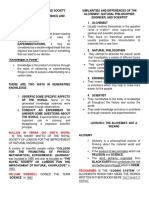Speaking Practice - No 46
Speaking Practice - No 46
Uploaded by
Le duong Minh AnhCopyright:
Available Formats
Speaking Practice - No 46
Speaking Practice - No 46
Uploaded by
Le duong Minh AnhCopyright
Available Formats
Share this document
Did you find this document useful?
Is this content inappropriate?
Copyright:
Available Formats
Speaking Practice - No 46
Speaking Practice - No 46
Uploaded by
Le duong Minh AnhCopyright:
Available Formats
Speaking Practice – No 46
Part 1:
Science
1. What do you think has been an important recent scientific
development? [Why?]
I believe the advancement of mRNA technology, particularly its use in vaccines,
has been one of the most significant recent developments. It has revolutionized the
way we combat infectious diseases and opened the door to treatments for other
conditions, such as cancer.
2. When did you start to learn science?
I started learning science in primary school, around the age of seven. We were
introduced to basic concepts of biology, chemistry, and physics, which gradually
became more complex as we moved into higher grades.
3. Is there any technology that you think is helpful in daily life?
Yes, I think smartphones are extremely useful. They allow us to access information
instantly, stay connected with others, and manage our daily tasks efficiently
through various apps.
4. Do you think science classes are important?
Absolutely. Science classes provide foundational knowledge about the world
around us, encouraging critical thinking and problem-solving skills, which are
essential in both personal and professional life.
Plants
1. Do Vietnamese people send plants as gifts?
Yes, it's quite common in Vietnam. People often give plants, particularly
ornamental ones like bonsai or lucky bamboo, as gifts to symbolize good luck and
prosperity.
2. Do you know anything about growing a plant?
Yes, I know the basics of growing plants, such as providing sufficient sunlight,
water, and nutrients. Different plants have different needs, so it’s important to
tailor the care accordingly.
3. What plant did you grow when you were young?
When I was young, I grew a sunflower in my school’s garden. I remember being
fascinated by how quickly it grew and how large its flowers became.
4. Do you keep plants at home?
Yes, I keep a few plants at home. I have some potted herbs in my kitchen and a
small succulent (a plant such as a cactus in which the leaves and stem are thick
and can store a lot of water) on my desk, which helps brighten up the space.
Part 2:
Describe a time you answer a phone call from someone you don't know in a
public place
You should say:
Where it happened
What he/she said
How you corresponded
And explain how you felt about the experience.
So, a while back, I had an experience with an unexpected phone call while I was at
a café in town. I was sitting by the window, sipping on my coffee, and enjoying a
book when my phone rang. The number on the screen was unfamiliar, but I
decided to answer it, thinking it might be something important.
The caller introduced himself with a very formal tone and claimed to be from a
financial institution. He said there was an urgent issue with my account that
needed immediate attention. I have to admit, the way he spoke with all those
technical terms and a sense of urgency was quite convincing. He mentioned some
sort of suspicious activity and warned that my account could be at risk if I didn’t
act quickly.
I felt a bit uneasy yet decided to stay calm. I asked him for more details, like his
name and the official contact information of the office so I could verify the claims.
To my surprise, the caller hesitated and gave vague responses, which raised my
suspicions. He insisted that I provide personal information to resolve the issue right
away, which I definitely refused to do.
After that, I hung up the call and called my bank directly. They confirmed it was a
scam and my account was fine. I felt relieved but frustrated by the intrusion.
All in all, this situation reminded me to stay vigilant with such calls, especially in
public places where distractions are common.
urgent (adj): khẩn cấp
suspicious (adj): nghi ngờ
uneasy (adj): lo lắng
vague (adj): mơ hồ
scam (n): lừa đảo
intrusion (n): sự xâm phạm
vigilant (adj): cảnh giác
Part 3:
1. Do most people mind others talking on the phone in public places?
Yeah, a lot of people do get annoyed when others talk loudly on the phone in
public. It can be really distracting, especially if you’re trying to focus or enjoy a
quiet moment. It’s one thing if it’s a casual setting, but in places like libraries or
nice restaurants, it can really bother people.
2. What are the differences between sitting beside a person who keeps
talking on the phone and a person who keeps talking to you?
On the one hand, sitting next to someone on the phone can be pretty uncomfortable
because you overhear their conversation without being part of it. It can feel
intrusive. On the other hand, when someone’s talking directly to you, you’re
involved in the conversation, which is usually more engaging and personal. Plus,
you can control the flow of the chat and contribute to it.
3. Why do some people not care about what they do in public places?
Some people might not realize how their actions affect others, or they’re just not
thinking about it. Sometimes people get so wrapped up in their own world that
they forget about common courtesy. It’s like they’re in their own bubble and
don’t notice how their behavior impacts those around them.
wrapped up: đắm chìm
courtesy (n): phép lịch sự
4. Do you think parents should teach their children not to behave badly in
public places?
Absolutely. Parents should definitely teach their kids about good manners and
being considerate in public. It’s important for children to learn how to behave
properly, respect others’ space, and understand social norms. This helps them
interact well with others and makes public spaces more pleasant for everyone.
social norms: chuẩn mực xã hội
good manner: cách cư xử tốt
considerate (adj): chu đáo, quan tâm
You might also like
- Recording Script Close-Up C2 Student's Book With Answers PDFDocument32 pagesRecording Script Close-Up C2 Student's Book With Answers PDFAnh Bảy60% (5)
- Educational Foundations - Soc Comp ExamDocument9 pagesEducational Foundations - Soc Comp ExamGui FawkesNo ratings yet
- Speaking Test of ChouDocument5 pagesSpeaking Test of ChouLovely StellarNo ratings yet
- SubmmisionDocument5 pagesSubmmisionHannah Jemaica YaraNo ratings yet
- English Group (Attention)Document14 pagesEnglish Group (Attention)Anonymous DoMqeqxLtNo ratings yet
- English Speaking Contest TopicsDocument10 pagesEnglish Speaking Contest TopicsZelloxanusNo ratings yet
- e subDocument6 pagese subthodna22No ratings yet
- Learners' Activity Sheets: Health 8Document10 pagesLearners' Activity Sheets: Health 8Leode Joy TulangNo ratings yet
- SpeakingDocument3 pagesSpeakingNí Ni NìNo ratings yet
- ĐỀ CƯƠNG B1.1Document7 pagesĐỀ CƯƠNG B1.1Lin TranNo ratings yet
- Cando G10Q2 SLHT6 EditedDocument6 pagesCando G10Q2 SLHT6 EditedJaymarie PepitoNo ratings yet
- Introduction To The Philosophy of The Human Person: Quarter 2 - Module 5Document11 pagesIntroduction To The Philosophy of The Human Person: Quarter 2 - Module 5Micah Jade Yadyadoc100% (3)
- M8 Process of CommunicationDocument10 pagesM8 Process of CommunicationKristine BarrantesNo ratings yet
- Answers 3Document26 pagesAnswers 3Keana100% (2)
- MEDIA AND INFORMATION LITERACY (AutoRecovered)Document21 pagesMEDIA AND INFORMATION LITERACY (AutoRecovered)Peter Gregg LibananNo ratings yet
- Speaking Part 3Document17 pagesSpeaking Part 3Sa SaNo ratings yet
- Speaking - Bài 17 - Vu Hoang AnDocument25 pagesSpeaking - Bài 17 - Vu Hoang AnFrank ZanderNo ratings yet
- Quiz 2 in Prof Ed 9Document3 pagesQuiz 2 in Prof Ed 9John MathewNo ratings yet
- Official English Speaking Contest TopicsDocument15 pagesOfficial English Speaking Contest TopicsZelloxanusNo ratings yet
- How Does Technology Affects TeensDocument8 pagesHow Does Technology Affects TeensDelia Mae Tao-ingNo ratings yet
- NOISEDocument2 pagesNOISEdung vũ thị thùyNo ratings yet
- Introduction To The Philosophy of The Human Person Quarter 1 - Module 2Document18 pagesIntroduction To The Philosophy of The Human Person Quarter 1 - Module 2Jr SanguezaNo ratings yet
- Grammatical Signals On Idea DevelopmentDocument54 pagesGrammatical Signals On Idea DevelopmentAsiel Rie RaytanaNo ratings yet
- Express Yourself & Speak Your MindDocument10 pagesExpress Yourself & Speak Your MindZoe Nathaniel BenitoNo ratings yet
- COMMUNICATIONDocument5 pagesCOMMUNICATIONAliceNo ratings yet
- Almaden, Angel Mica V. Beed-Ii III. Questions To Ponder. Read The Questions and Instructions Carefully. Write Your Answers On A Separate SheetDocument4 pagesAlmaden, Angel Mica V. Beed-Ii III. Questions To Ponder. Read The Questions and Instructions Carefully. Write Your Answers On A Separate SheetAngel Mica AlmadenNo ratings yet
- 11 Practical Ways To Reduce Digital ConsumptionDocument7 pages11 Practical Ways To Reduce Digital ConsumptionDave Joseph CondeNo ratings yet
- Part 1:aqqqaaq: ExampleDocument6 pagesPart 1:aqqqaaq: ExampleLin TranNo ratings yet
- Materi UjianDocument11 pagesMateri UjianZahwa Nur SyahdaNo ratings yet
- SPEAKING IELTS0 New UpdateDocument135 pagesSPEAKING IELTS0 New UpdateAnh LâmNo ratings yet
- Religion and Conflict 1Document6 pagesReligion and Conflict 1Shey SheyNo ratings yet
- English 9 Q3 Module 3Document22 pagesEnglish 9 Q3 Module 3Angelica Dela Cruz100% (1)
- Unit 7 Environmental ProtectionDocument3 pagesUnit 7 Environmental ProtectionHoàng LườngNo ratings yet
- Book Activty 3Document6 pagesBook Activty 3ShinNo ratings yet
- LearnEnglish Listening C1 Tech AddictionDocument5 pagesLearnEnglish Listening C1 Tech AddictionMilena AraújoNo ratings yet
- EnglishDocument14 pagesEnglishJaeden Kyle C. MartinezNo ratings yet
- Stella 11 19Document4 pagesStella 11 19jeeanebiaNo ratings yet
- Speaking Module 1,2,3,4,5,6,7,8,9,10Document9 pagesSpeaking Module 1,2,3,4,5,6,7,8,9,10anhhoai397No ratings yet
- Communication and AttitudeDocument11 pagesCommunication and AttitudeelrasymorsyNo ratings yet
- Unit I Health Literacy For StudentsDocument11 pagesUnit I Health Literacy For StudentsNilam Putri Defa100% (1)
- Ielts Speaking Part 3 Simon-Tuhocielts - VNDocument26 pagesIelts Speaking Part 3 Simon-Tuhocielts - VNPhương PhạmNo ratings yet
- Topic 1Document20 pagesTopic 1Nguyễn Lê Thanh HoàngNo ratings yet
- ĐỀ CƯƠNG NGHE NÓI 3Document4 pagesĐỀ CƯƠNG NGHE NÓI 3Thu TràNo ratings yet
- Unit 8Document10 pagesUnit 8makramNo ratings yet
- CheckpointDocument2 pagesCheckpointVee YaNo ratings yet
- Essay Outline ActivityDocument4 pagesEssay Outline Activity[AP-Student] Lhena Jessica GeleraNo ratings yet
- Đề 1Document17 pagesĐề 1hle211018No ratings yet
- Band6.5 Part3Document61 pagesBand6.5 Part3980442121No ratings yet
- Statistical Inferences 2. Factual Knowledge 3. Informed Opinion 4. Factual Knowledge 5. Statistical InferencesDocument23 pagesStatistical Inferences 2. Factual Knowledge 3. Informed Opinion 4. Factual Knowledge 5. Statistical InferencesRoland Acob Del Rosario Jr.No ratings yet
- Mil 1Document2 pagesMil 1KristelNo ratings yet
- SPEAKING MIDTERM (1)Document4 pagesSPEAKING MIDTERM (1)Ruǎn Ying ShūNo ratings yet
- Ielts Speaking New Update 2022Document163 pagesIelts Speaking New Update 2022HT GiangNo ratings yet
- Q4 October - DecemberDocument27 pagesQ4 October - DecemberWill Go NalamNo ratings yet
- Public Speaking AssignmentDocument4 pagesPublic Speaking AssignmentSiti NursyafiqahNo ratings yet
- Speak E TTDocument6 pagesSpeak E TTtrieuquan535No ratings yet
- Asynchronous Week 2.: A. Firming UpDocument2 pagesAsynchronous Week 2.: A. Firming UpJed Vincent EsguerraNo ratings yet
- Part 2 Speaking ForecastDocument36 pagesPart 2 Speaking ForecastThảo PhạmNo ratings yet
- Urban Suburban I Live in The Suburbs of Vinh: I've Live Here All My Life That's Why I've Live Here For 17 YearsDocument3 pagesUrban Suburban I Live in The Suburbs of Vinh: I've Live Here All My Life That's Why I've Live Here For 17 YearsHoonie TrânNo ratings yet
- Homeroom Guidance Quarter 3 - Grade 6 - Module 7 - I Care For You and MeDocument14 pagesHomeroom Guidance Quarter 3 - Grade 6 - Module 7 - I Care For You and MeMia Manaay100% (1)
- How to Talk to Anyone In Any Situation: Unlock the Secrets of Effective CommunicationFrom EverandHow to Talk to Anyone In Any Situation: Unlock the Secrets of Effective CommunicationRating: 4.5 out of 5 stars4.5/5 (4)
- How To Get Over The Fear Of Public Speaking Learn How to Speak Effectively in Public, Get Over your Anxiety and Deliver Your Message EffectivelyFrom EverandHow To Get Over The Fear Of Public Speaking Learn How to Speak Effectively in Public, Get Over your Anxiety and Deliver Your Message EffectivelyRating: 4.5 out of 5 stars4.5/5 (2)
- Lesson 8 - Practice SpeakingDocument6 pagesLesson 8 - Practice SpeakingLe duong Minh AnhNo ratings yet
- Practicing - categorizing questions - Ielts speaking part 3Document5 pagesPracticing - categorizing questions - Ielts speaking part 3Le duong Minh AnhNo ratings yet
- Lesson 9 - video reportsDocument7 pagesLesson 9 - video reportsLe duong Minh AnhNo ratings yet
- Lesson 2 - 27.12 - Practice SpeakingDocument5 pagesLesson 2 - 27.12 - Practice SpeakingLe duong Minh AnhNo ratings yet
- Lesson 3 - Video reports - 30.12Document6 pagesLesson 3 - Video reports - 30.12Le duong Minh AnhNo ratings yet
- Lesson 2 - 24.12 - Video reportsDocument4 pagesLesson 2 - 24.12 - Video reportsLe duong Minh AnhNo ratings yet
- Lesson 4 - 7.1 - Video ReportsDocument6 pagesLesson 4 - 7.1 - Video ReportsLe duong Minh AnhNo ratings yet
- Speaking Practice - No 42Document5 pagesSpeaking Practice - No 42Le duong Minh AnhNo ratings yet
- Type Your Title Here. The Apa Recommendation For Title Length Should Not Exceed 12 WordsDocument10 pagesType Your Title Here. The Apa Recommendation For Title Length Should Not Exceed 12 WordsManz ManzNo ratings yet
- Sitauated Meaning and Context. BelkisDocument4 pagesSitauated Meaning and Context. BelkisSa Mira100% (1)
- Estern Visayas Colege of Science Wand Technology: John Dexter SubosaDocument2 pagesEstern Visayas Colege of Science Wand Technology: John Dexter SubosaChristian Ryan VictorianoNo ratings yet
- Origin of Earth .Document4 pagesOrigin of Earth .Ahmed AmerNo ratings yet
- Centripetal Force and Circular Motion Lab CC NGSS Revision 2014Document2 pagesCentripetal Force and Circular Motion Lab CC NGSS Revision 2014pepe zimbaNo ratings yet
- FSC100 Lecture - 2 - RedactedDocument28 pagesFSC100 Lecture - 2 - RedactedavaimaginesNo ratings yet
- Supply Chain Risk Assessment: A Content Analysis-Based Literature ReviewDocument31 pagesSupply Chain Risk Assessment: A Content Analysis-Based Literature ReviewPAKIONo ratings yet
- Review Scrutiny Result ListDocument35 pagesReview Scrutiny Result ListSARKAR JAVED AKHTARNo ratings yet
- Danilo F. Maribao Paliparan Iii Senior High School Dasmarinas City, CaviteDocument26 pagesDanilo F. Maribao Paliparan Iii Senior High School Dasmarinas City, CaviteShielmyn Kate Junio ManuelNo ratings yet
- 2223 Level LS Mathematics August Make-Up End of Year Exam MaterialsDocument2 pages2223 Level LS Mathematics August Make-Up End of Year Exam MaterialsMuhammad YousafNo ratings yet
- Theoretical Foundation of Nursing Chapter 1Document13 pagesTheoretical Foundation of Nursing Chapter 1niccmacc004No ratings yet
- A Review of Radical Behaviorism For ABA PractitionDocument6 pagesA Review of Radical Behaviorism For ABA PractitionJimmy MoralesNo ratings yet
- Jacques Vallee - Messengers of Deception - UFO Contacts and Cults (1979)Document272 pagesJacques Vallee - Messengers of Deception - UFO Contacts and Cults (1979)DirkTheDaring1194% (17)
- Ss 1 Price List - 050122Document1 pageSs 1 Price List - 050122agbaipissNo ratings yet
- Guidelines For Interpreting The Results of Bibliometric Analysis A Sensemaking ApproachDocument10 pagesGuidelines For Interpreting The Results of Bibliometric Analysis A Sensemaking ApproachJyothi MallyaNo ratings yet
- Chemistry: GCE Ordinary Level (2017) (Syllabus 5073)Document30 pagesChemistry: GCE Ordinary Level (2017) (Syllabus 5073)hadysuciptoNo ratings yet
- MASc-Thesis-Construction Delay Analysis Under Multiple Baseline UpdatesDocument113 pagesMASc-Thesis-Construction Delay Analysis Under Multiple Baseline UpdatesBrian BowieNo ratings yet
- Anova 6245Document7 pagesAnova 6245Fischer SnapNo ratings yet
- Vacancy Announcement - Project Coordinator, Governance at Janwani, MCCIA PuneDocument4 pagesVacancy Announcement - Project Coordinator, Governance at Janwani, MCCIA PunenaimkeruwalaNo ratings yet
- STS Reviewer FinalsDocument26 pagesSTS Reviewer FinalsDaniela CaguioaNo ratings yet
- AlkoholismoDocument2 pagesAlkoholismoArmando MalloNo ratings yet
- Delmar Bryant - The Art of Alchemy, Or, The Generation of Gold - A Course of Practical Lessons in Metallic Transmutation (1Document37 pagesDelmar Bryant - The Art of Alchemy, Or, The Generation of Gold - A Course of Practical Lessons in Metallic Transmutation (1adiramled100% (4)
- Apakuki Koroi Optimum Design of Reinforced Concrete Pile Foundation Using Australian Design 367025 1272949549 PDFDocument2 pagesApakuki Koroi Optimum Design of Reinforced Concrete Pile Foundation Using Australian Design 367025 1272949549 PDFAcery CodyNo ratings yet
- Stephon Jackson - 10th Grade Registration For 2023-2024.xlsx - KamiDocument2 pagesStephon Jackson - 10th Grade Registration For 2023-2024.xlsx - KamiStephon JacksonNo ratings yet
- Searle - Reply To GrossDocument13 pagesSearle - Reply To GrossJLNo ratings yet
- Research Methodology and Technical WritingDocument7 pagesResearch Methodology and Technical Writingmrsukesh67% (3)
- 53 MIT School of Engineering (MIT-SOE)Document5 pages53 MIT School of Engineering (MIT-SOE)Dheeraj BangarNo ratings yet
- Spot On Assessment Task and Rubric 1Document6 pagesSpot On Assessment Task and Rubric 1api-360146109No ratings yet
- Nur 091 Reviewer 2Document2 pagesNur 091 Reviewer 2miloubandoNo ratings yet

































































































